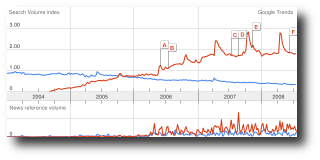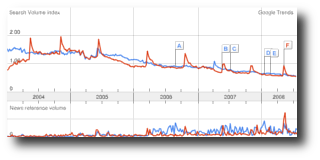On Chaos
I’ve been a fan of chaos theory and emergent order for a long time now — the idea that simple rules repeatedly applied build complex and creative results is just beautiful to me, and seeing the same principles apparently apply in different areas — from evolutionary theory to the Wisdom of Crowds — for equally astounding results is outright awe inspiring. Ultimately, in various ways, it hits all my buttons — complicated maths, relevance to lots of different things, egalitarianism and making cool things happen; and as a result of all that, these days it’s a fundamental part of my belief set.
As should be the case with all good beliefs, that’s been challenged lately in a variety of ways. Debian, for example, has had a real mean streak for a while that just doesn’t mesh with my sense of the sort of good result that should spontaneously appear from a bunch of generous people working together. Likewise, Wikipedia seems to lately be suffering increasingly from something like censorship by bureaucracy rather than the wild free-for-all that somehow produces something better than the best experts. You could pretty easily call those errors of taste — maybe they’re good results, and I just happen not to like them — but I don’t think it’s a big call to think otherwise, and it’s certainly not a big call for me to prefer results I happen to like. And, of course, you could just call it an over-generalisation: maybe random anarchy is good to a point, but only to a point.
Ubuntu is a fascinating argument for that, both because it’s had obvious results in a short amount of time  and because it shares a lot in common with Debian. Some things in common: both Debian and Ubuntu are trying to release a top notch, multi-platform, free, Linux based operating system; both are based on the deb package format, dpkg and apt; both had a large number of key developers in common over 2005-2006; both are based on almost exactly the same source. The key differences, then, seem to me to be these: Ubuntu is younger; Ubuntu spends money; Ubuntu relies on proprietary software; and Ubuntu has a self-appointed benevolent dictator for life.
and because it shares a lot in common with Debian. Some things in common: both Debian and Ubuntu are trying to release a top notch, multi-platform, free, Linux based operating system; both are based on the deb package format, dpkg and apt; both had a large number of key developers in common over 2005-2006; both are based on almost exactly the same source. The key differences, then, seem to me to be these: Ubuntu is younger; Ubuntu spends money; Ubuntu relies on proprietary software; and Ubuntu has a self-appointed benevolent dictator for life.
From what I can see, one of those has to be responsible for the differences between Ubuntu and Debian. There might be other reasons in between them — perhaps it’s Ubuntu’s code of conduct or marketing nous or some particular feature set; but as far as I can see Debian could have done any or all of those things — the question is why it didn’t (or why it hasn’t). And the only ways Debian differs from Ubuntu that it can’t change, that I can think of, are the one’s above: it’s an older project, maybe that stops it from being as fun; it’s dedicated to free software so maybe that stops it from building a site as slick as Launchpad; it’s reluctant to spend money; and it’s somewhere between a democracy and an anarchy, but there certainly isn’t anyone who could be called dictator for life, benevolent or otherwise.
If it’s just the age of the projects that’s the issue, that’s not very interesting. There have been lots of newcomers through the years that have grabbed attention from Debian folks then levelled (or died) off: Progeny, Storm Linux, GenToo, Lindows and others, and if it’s just that one of them’s finally come along that’s going to level off higher than Debian, that’s no big deal. But that doesn’t seem all there is to it, to me: there seems like there’s an much bigger difference than that can explain. And likewise for Launchpad; I’ve no doubt there are some benefits from keeping it proprietary, but if it were freed tomorrow or two years ago, I don’t think it would change the state of the distros substantively. Maybe I’m wrong, of course.
Maybe it’s money, in which case, well, that’s relatively easy to fix. There’s plenty of money in the world, and getting it into the right hands might not be a trivial problem, but it’s at least tractable. But on the other hand, I tried that in Debian, and it turned out a lot less tractable than I expected — so maybe even if it is a cause, it’s not a root cause, but another symptom, just like differences in marketing.
Which would leave it down to differences in leadership, and the conclusion that at least in this circumstance, democracy or anarchy is doomed to failure, when put up against a sufficiently clever and resourced dictatorship.
To be fair, that’s possibly true anyway — at worst, you could just keep adding resources to the potential dictator (and thus people they can hire, or things they can buy), or taking them away from your democracy and your dictator’s going to win eventually. But in this case, Ubuntu started with (well) under US$500M (the Ubuntu Foundation was founded with $10M), so it seems fair to say that it had no more than 100 to 1000 times Debian’s monetary resources (there’s about US$100,000 in Debian’s bank account most of the time, and DebConf tends to cost about US$50,000 each year). And conversely, Ubuntu started with only a handful of people, while at the same time Debian had hundreds of developers, and thousands of contributors.
So that leaves me with a quandry: the simplest explanation of Ubuntu’s success seems to come down to being a well-run benevolent dictatorship, but the thing that most excites me about the whole free software deal is the spontaneous emergence of order and quality from undirected contributions.
To quote Ian Murdock from a while ago:
Bravo, AJ. And keep at it. It takes a steely sort of person to stick their necks out like this, but strong leadership is absolutely essential to the success of any project, open source or otherwise. After all, success doesn’t just happen at random.
Where does your leadership go, when your entire aim is exactly the sort of success that does just happens at random?
Of course, that’s a simple explanation, but it’s not the only one possible, whatever Occam’s razor might have to say about it. One other is that it’s not that Ubuntu has a dictator that’s made it such a phenomenon, but that underneath that, it has a community that is actually more effective and vibrant than Debian’s. That’s a somewhat awkward claim to make though, because you can’t simply look at it today, but you need to go back right to the beginning, and say that even when it first came out of hiding, with only dozens of contributors compared to Debian’s hundreds or thousands, that even then it had a better community — one that better empowered people at every level to participate and influence the project’s direction — than Debian did, and that that’s continued since.
That’s not without some plausibility though; Debian’s had plenty of problems accepting new developers, and even when there aren’t any problems at all, it doesn’t approach the evangelical nature of Ubuntu — whose very name, and its “humanity to others” implies outreach, and whose first goal is about converting others. The accessibility of the website, or the online blueprints and specifications and the travelling development conferences and sprints, also seem like they probably provide for better community input and interaction than anything equivalent Debian manages.
Assuming that’s true, a lot of those attributes are fairly simple results of having a new project that doesn’t have inbuilt resistance to those ideas, and a dictator who can make decisions even if there is resistance, and who generally manages to make good ones. There are some consequent limitations you’d expect, though; for instance that nobody will contribute as much to Ubuntu as Mark does/has. Fortunately for Ubuntu, in both dollar terms, and time/insight terms, that’s a pretty high benchmark.
The downside is that the form that conclusion takes is a good one for justifying all sort of stupid, extremist positions in the presence of contradictory evidence. “What? It didn’t work? You just have to try harder!” 
Oh, a PS. Google Trends is probably a better measure of people new to a topic, than total interest; though it’s obviously imperfect in lots of ways at that too. If you assume nobody ever gets bored of your topic, that works as the derivative of actual interest, but that’s not a great assumption either. Anyhoo, it’s also kinda interesting to see just how closely Fedora and Debian are tracking.